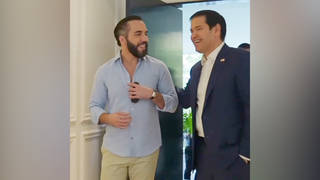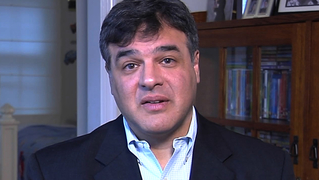
Related
Guests
- Ray McGovernformer CIA analyst who later helped create Veteran Intelligence Professionals for Sanity to expose the way intelligence was being falsified to “justify” war on Iraq.
- Mike Germanfellow at NYU’s Brennan Center for Justice. From 1988 to 2004, he served as an FBI agent specializing in domestic counterterrorism. He left after reporting continuing deficiencies in FBI counterterrorism operations to Congress. His recent piece in The Guardian is titled “The NSA Won’t Shut Up About Snowden, But What About the Spy Who Stole More?”
- Julia AngwinPulitzer Prize-winning investigative journalist, currently at ProPublica and formerly with The Wall Street Journal. Her new book is called Dragnet Nation: A Quest for Privacy, Security, and Freedom in a World of Relentless Surveillance.
The spat between the CIA and its congressional overseers has intensified after Senator Dianne Feinstein took to the Senate floor to directly accuse the CIA of spying in an effort to undermine a probe of the agency’s torture and rendition program. The Senate Intelligence Committee’s report has yet to be released but reportedly documents extensive abuses and a cover-up by CIA officials. Feinstein says the CIA broke the law in secretly removing more than 900 documents from computers used by panel investigators. She also accused the CIA of intimidation in requesting an FBI inquiry of the panel’s conduct. CIA Director John Brennan has rejected Feinstein’s allegations. Meanwhile, former National Security Agency contractor Edward Snowden has weighed in by accusing Feinstein of hypocrisy for criticizing alleged CIA spying on U.S. senators while condoning government surveillance of private citizens. We host a roundtable discussion with three guests: former FBI agent Mike German, former CIA analyst Ray McGovern, and Pulitzer-winning journalist Julia Angwin, author of the new book, “Dragnet Nation: A Quest for Privacy, Security, and Freedom in a World of Relentless Surveillance.”
Transcript
NERMEEN SHAIKH: The head of the Senate Intelligence Committee harshly criticized the Central Intelligence Agency Tuesday for attempting to obstruct its investigation into the CIA’s use of torture following the 9/11 attacks. The report has yet to be released but allegedly documents extensive abuses and a cover-up by CIA officials to Congress. Senator Dianne Feinstein took to the Senate floor on Tuesday to accuse the CIA of accessing computers used by Senate staff.
SEN. DIANNE FEINSTEIN: I have grave concerns that the CIA’s search may well have violated the separation-of-powers principles embodied in the United States Constitution, including the speech and debate clause. It may have undermined the constitutional framework essential to effective congressional oversight of intelligence activities or any other government function. I have asked for an apology and a recognition that this CIA search of computers used by its oversight committee was inappropriate. I have received neither.
NERMEEN SHAIKH: Feinstein also accused the CIA of secretly removing more than 900 documents from computers used by the Senate Intelligence Committee, and said it tried to intimidate congressional investigators by requesting an FBI inquiry of their conduct. At a public event nearby in Washington, CIA Director John Brennan rejected Feinstein’s allegations.
JOHN BRENNAN: As far as the allegations of, you know, the CIA hacking into, you know, Senate computers, nothing could be further from the truth. I mean, we wouldn’t do that. I mean, that’s—that’s—that’s just beyond the—you know, the scope of reason in terms of what we would do.
NERMEEN SHAIKH: Meanwhile, former National Security Agency contractor Edward Snowden accused Feinstein of hypocrisy for criticizing alleged CIA spying on U.S. senators while condoning government surveillance of private citizens. In a statement to NBC News, he said, quote, “It’s clear the CIA was trying to play 'keep away' with documents relevant to an investigation by their overseers in Congress, and that’s a serious constitutional concern. But it’s equally if not more concerning that we’re seeing another [quote] 'Merkel Effect,' where an elected official does not care at all that the rights of millions of ordinary citizens are violated by our spies, but suddenly it’s a scandal when a politician finds out the same thing happens to them.” Snowden was apparently referring to German Chancellor Angela Merkel’s failure to condemn the NSA for mass surveillance of communications of German citizens and her indignation at reports that the U.S. had listened in on her personal conversations.
AMY GOODMAN: For more, we host a roundtable discussion with three guests.
Mike German is with us, fellow at NYU’s Brennan Center for Justice. From 1988 to 2004, he served as an FBI agent specializing in domestic counterterrorism. He left after reporting deficiencies in the FBI’s counterterrorism operations to Congress. His recent piece in The Guardian is “The NSA Won’t Shut Up About Snowden, But What About the Spy Who Stole More?”
Ray McGovern is with us again, a former CIA analyst whose duties included chairing National Intelligence Estimates and preparing the President’s Daily Brief for then-President George H.W. Bush. He briefed one on one to President Ronald Reagan’s most senior national security advisers from ’81 to ’85. In January 2003, McGovern helped create Veteran Intelligence Professionals for Sanity to expose the way intelligence was being falsified to justify the war in Iraq.
And we’re joined by Julia Angwin, Pulitzer Prize-winning investigative journalist, currently at ProPublica, formerly with The Wall Street Journal. She has a new book out called Dragnet Nation: A Quest for Privacy, Security, and Freedom in a World of Relentless Surveillance.
Well, there’s a lot to take on right now. Ray McGovern, let’s begin with you. As a former CIA analyst, explain what this conflict is about. Two things, the CIA—how did the CIA spy on the Senate Intelligence staffers, and what was the report that the Senate Intelligence Committee is trying to put out?
RAY McGOVERN: Well, this goes back to the key question of supervising the intelligence community. In the '70s, there was the Church Committee, looking into abuses of all kinds—illegal wiretapping, assassinations and that kind of thing—and it was recognized that you needed congressional oversight. Now, that meant congressional oversight, not congressional overlook, which is what we've had over the last couple years.
And if you fast-forward here, 9/11, people always say, “After 9/11, everything changed.” Well, it did change. You know, after 9/11, the president—actually, on the evening of 9/11—said, “I don’t care what the international lawyers say. We’re going to kick some ass.” Now, how do I know that? Because Richard Clarke was there, and he reported that in his book. What was the next step? Well, they took some prisoners in Afghanistan, and the first person tortured was John Walker Lindh, an American citizen, OK? Now, who was told about this, in terms of oversight? Well, the two patsies, the two patsy senators on the Senate Intelligence Committee, Pat Roberts and Jay Rockefeller, who had the habit of taking notes and then putting it in his own safe, because it was classified, right? OK.
Four years—four years later, September 6, 2006, a big day. First off, General Hayden, General Michael Hayden, who was the head of NSA when he decided to violate his oath to the Constitution and allow illegal warrantless wiretapping of American citizens, he had earned his spurs, and he had become head of the CIA. OK? And so, when the president, President Bush at the time, decided that he would make a clean breast of things, OK, and defend what he called “an alternative method of procedures,” which now have become EITs—EITs, enhanced interrogation techniques, meaning torture—he was going before the cameras in the afternoon of September 6, 2006. What happened in the morning? General Hayden hustled down and told the rest of the senators on the Senate Intelligence Committee what was going on—four-and-a-half years late about torture, OK?
What’s the other thing that happened? This is very significant. The head of Army intelligence, John Kimmons, lieutenant general, who made his career on interrogation, OK?—very proud of him, because I’m a—I was an Army officer. He got up and pre-empted the president, right across the river in the Pentagon. And what he said was—and I quote—”No good intelligence is going to come from abusive practices. I think history tells us that. I think the empirical evidence of the last five years,”—this is ’06, OK—”hard years, tells us that.”
So, what’s the point here? The point here is that the Army and everybody else knew, number one, that torture was going on; number two, that it was ineffectual if you wanted reliable information.
Last thing I’ll say is that if you want unreliable information, man, torture works like a charm. And that’s what they wanted. They wanted somebody to be tortured into saying there were links, operational links, between Iraq and al-Qaeda. And guess what? With the help of the Egyptian service, al-Libi did that. The president quoted him the next day, and Congress voted to authorize the Iraq War. It was that bad, OK?
So, what we’re hearing now is Senator Feinstein playing catch-up ball. She’s very, very upset, at least ostensibly, that her people are being monitored. And, actually, there’s a crimes report out there. But, you know, I think my colleague Mike German had it right this morning. I said, “What do you think is going to happen, Mike?” He said, “There will probably be a beer summit, and it’ll be smoothed over.”
NERMEEN SHAIKH: Well, during her remarks on the Senate floor on Tuesday, Senator Dianne Feinstein also indicated that the source of some of the CIA documents may have been a whistleblower. The internal Panetta review refers to an internal review initiated by then-CIA Director Leon Panetta of the detention and interrogation program.
SEN. DIANNE FEINSTEIN: We have no way to determine who made the internal Panetta review documents available to the committee. Further, we don’t know whether the documents were provided intentionally by the CIA, unintentionally by the CIA, or intentionally by a whistleblower.
NERMEEN SHAIKH: Mike German, could you explain what the significance is of Dianne Feinstein indicating that the source may have been a whistleblower from within the CIA?
MIKE GERMAN: Sure. So part of the issue is how the Senate staffers got this document. And to a certain extent, what CIA Director John Brennan said is correct: They didn’t hack into a Senate computer, because they didn’t have to. In fact, they created a CIA computer for the Senate staffers to use. But then, over the course of 2010, the CIA staffers found out the documents they had reviewed on this system were disappearing from the system, and there was a dust-up over that bureaucratically behind closed doors. But then they—in June of 2013, the CIA issued a rebuttal to the Senate Intelligence report, and later they found out that there was this internal document that conflicted with the rebuttal. So, when that was discovered, that the Senate had that, the CIA apparently went back into their—again, their own computer that was being used by the Senate, and apparently was trying to find out how it was that they got this document.
And that Senator Feinstein is indicating now it may have been a whistleblower, I think, raises serious concerns, because her committee has been very unresponsive to requests to provide protections for intelligence community whistleblowers. Right now they aren’t very well protected. And it’s the Intelligence Committees in both the House and Senate that have been resistant to allowing legal protections for intelligence community whistleblowers. So this whistleblower who may have given the Senate this report is basically unprotected.
AMY GOODMAN: And explain how it works. I mean, for people to understand, when the Senate Intelligence staffers are doing their research, they go to the CIA, and the CIA provides them with computers and then spies on what they look at in the computers.
MIKE GERMAN: Right. I mean, this is really an extraordinary situation that I think goes to what Ray said about, you know, this is supposed to be oversight of the CIA that the Senate is doing, not, you know, allowing the CIA to set the terms for the oversight of their own work. And this is an extraordinary situation where, through agreement, rather than giving the CIA documents to the committee as asked, they required the committee staff to come to a facility in Virginia, where they had access to apparently a stand-alone system that was created for this purpose, that they then put some six million documents in. But then there was some dispute about who controlled the documents, what the Senate could do with the documents. And this document apparently was printed off and taken back to the Senate, which is what the CIA’s competing crimes report is about, that there was something inappropriate with that, and that was the defense that Senator Feinstein was making.
AMY GOODMAN: And you worked for the FBI. They were also accusing the CIA of bringing in the FBI to thwart their investigation to investigate Senate staffers.
MIKE GERMAN: Right. It’s basically intimidation of the overseers, right? If I, as a staffer, know that if I become too aggressive in my oversight, I might be charged with a crime in this heavily classified area, that might, you know, make me be a little less robust in my inquiry.
AMY GOODMAN: And let’s not let this whole conflict obscure what it is that’s being investigated: the whole issue of torture and what the White House calls rendition, which is White House for kidnapping.
MIKE GERMAN: Right, and another example of the failure of oversight. This Senate report—it’s supposedly over 6,000 pages—was finished almost over a year ago, and yet it’s the CIA that’s holding up the publication of this report, so we can’t see what it is, rather than the Senate just saying, “It’s our report. We can vote and put it out and, you know, give the CIA a chance to redact what they think is necessary. But if they won’t do that, we’re just going to publish it.” And, you know, that is, again, astonishing that the overseers are being prevented by the people they’re supposed to oversee.
AMY GOODMAN: And what about, Ray McGovern, what Edward Snowden just said to NBC? I mean, you went to Russia. You gave Edward Snowden an award. You have Senator Feinstein now taking on the CIA, who has been rather vicious in taking on Edward Snowden. She is considered one of the greatest apologists for the Central Intelligence Agency. So for her to take on this agency, the agency might be in big trouble. But what about how Snowden’s documents fit into this story?
RAY McGOVERN: Well, how much of what Senator Feinstein did yesterday was posturing, we’ll know in the next couple of weeks. But, you know, on the face of it, for Senator Feinstein in her speech yesterday to decry the violation of the Fourth Amendment, when she has sat by—
AMY GOODMAN: Search and seizure.
RAY McGOVERN: —and where—yeah, the one that says no one shall be deprived of, you know, the right to have privacy. She has blessed that by the NSA. She has defended it. She’s approved it. And now, all of a sudden, she’s against the NSA or anybody else kind of invading the Senate’s privacy. So, you know, in a way, it struck me as giving hypocrisy a bad name. I think the beer summit is probably the likely outcome. The president’s a lawyer. He’ll get them all together and say, “Well, now, can’t we smooth this over?” But maybe not. Maybe John Brennan has overreached himself now. His record for truth is not very good. And it may be that Senator Feinstein and the president will face up to the fact that this is not the right person to be head of the CIA.
NERMEEN SHAIKH: So, Julia Angwin, can you talk about how this will affect future whistleblowers and the journalists and publications who cover them?
JULIA ANGWIN: Well, already, journalists and whistleblowers are in a difficult situation. As a journalist myself, you know, it’s very hard to assure a confidential source that you could keep your communications confidential. If the Senate Intelligence Committee can’t keep its investigation confidential, you know, it’s very difficult for me out there to say I will be able to do it. And not all sources are willing to go live in Russia. And so, we’re in a difficult time for whistleblowers. And I—this is why I wrote this book, Dragnet Nation, because I feel that we’re in a world where ubiquitous surveillance is really chilling our speech. You know, people are afraid to talk to the press. And it looks like maybe the Senate is afraid to publish its report on the CIA. And this is the result of this surveillance.
NERMEEN SHAIKH: And, Mike German, can you say what some of the initiatives are, the mechanisms that are being considered to protect whistleblowers—of course, they haven’t been passed—in the intelligence community?
MIKE GERMAN: Right. So, where the situation sits now, in 2012 the Senate passed the Whistleblower—or the Congress passed the Whistleblower Protection Enhancement Act, but cut out a section that would have given intelligence community whistleblowers some better protections. The president issued a directive that ordered the agencies to create an internal process, but so far that has been delayed. And we haven’t—I’m not aware of any whistleblowers using that process, if it even exists at this point.
NERMEEN SHAIKH: There’s also a threat of retaliation, or it doesn’t protect whistleblowers from retaliation?
MIKE GERMAN: Well, and that’s the thing. This administration has been more aggressive against whistleblowers than any previous administration, charging them even with very serious charges like Espionage Act. And there’s an Insider Threat Program that they’re initiating, which encourages government employees to report on one another when they see conduct that they think is suspicious. So it’s this sort of competing values that they’re doing, on the one hand saying they care about whistleblowers and want whistleblowers, on the other hand persecuting and prosecuting them, persecuting them inside the agencies and then prosecuting them if they report out.
AMY GOODMAN: NSA whistleblower Edward Snowden gave a rare public speech Monday at the South by Southwest Interactive Festival in Austin, Texas. It was the first time Snowden has directly addressed a U.S. audience since he left the country last May. He spoke via video stream from Russia, where he has been granted temporary political asylum.
EDWARD SNOWDEN: The NSA, the sort of global mass surveillance that’s occurring in all of these countries, not just the U.S.—and it’s important to remember that this is a global issue—they’re setting fire to the future of the Internet. And the people who are in this room now, you guys are all the firefighters. If data is being clandestinely acquired, and the public doesn’t have any way to review it, and it’s not legislatively authorized, it’s not reviewed by courts, it’s not consonant with our Constitution, that’s a problem.
AMY GOODMAN: That was Snowden speaking through a whole number of proxies, a little hard to understand. He added he believes his whistleblowing has improved U.S. security and that he wouldn’t hesitate to leak the same NSA files again. Journalist Glenn Greenwald also addressed the festival later in the day. Julian Assange addressed the festival on Saturday via video stream from the Ecuadorean Embassy in London, where he has political asylum. The significance of all of this? Julia, you are a Pulitzer Prize-winning journalist. What this means for your work and your own quest for privacy, as you went online to document how you could protect yourself?
JULIA ANGWIN: Yeah, it’s an incredibly difficult task these days. I mean, Edward Snowden mentioned some of the tools that he uses to protect himself when he goes online, and they’re incredibly cumbersome. And I, in my book, tried to see if I could use all these tools and still live in the modern world. And I have to say, it wasn’t the easiest task. One of the hardest things was actually trying to convince my sources, my journalistic sources, to use these really cumbersome encryption programs to communicate securely. And honestly, I started to think that maybe we should just all go back to the postal mail, because it actually has very good legal protections: They need a warrant to open it, unlike your email.
NERMEEN SHAIKH: Well, why are they cumbersome? Because it just takes longer? Or they’re difficult to master? Or…
JULIA ANGWIN: Well, the encryption programs, in particular, are often built by sort of open source communities. Some of the tools are not that well maintained, because the people who built them are not actually paid. It’s like their second job. And so, one thing I have been thinking about a lot is that we need to pay for our tools. You know, we have this idea that we want all—everything for free in life. And that’s one of the reasons we’ve gotten into this state of ubiquitous surveillance, is that we are paying with our data.
AMY GOODMAN: Well, we have to leave it there, but we’re going to continue the conversation after the show and post it online at democracynow.org. Julia Angwin, thanks for joining us. Her new book is Dragnet Nation. Mike German with NYU’s Brennan Center for Justice, and Ray McGovern, former CIA analyst.
That does it for the show. On Thursday, I’ll be in Flagstaff at Northern Arizona University; Friday in Santa Fe; Saturday in Denver, Colorado.












Media Options